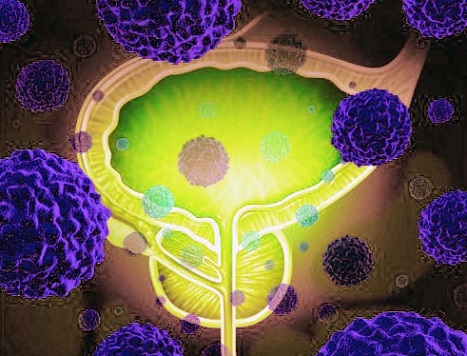Nikhil Prasad Fact checked by:Thailand Medical News Team Jul 15, 2024 9 months, 1 week, 3 days, 19 hours, 51 minutes ago
COVID-19 News: As the COVID-19 pandemic continues to impact lives worldwide, Malaysian researchers have highlighted a potential new health concern for men: COVID-19 might be linked to prostatitis. This
COVID-19 News report delves into the findings and their implications, emphasizing that the prostate, like many other organs, could be affected by the virus. The research was conducted by scientists from the Prince Court Medical Centre, MedCentral Consulting, and KPJ Healthcare University in Malaysia.
 Malaysian researchers warn that COVID-19 can cause Prostatitis
The Prostate and COVID-19: A New Concern
Malaysian researchers warn that COVID-19 can cause Prostatitis
The Prostate and COVID-19: A New Concern
Prostatitis, an inflammation of the prostate gland, is a common condition affecting men's health, particularly those under 50. It can cause significant pain and discomfort, often impacting the quality of life. According to the study by the Malaysian researchers, the virus that causes COVID-19, SARS-CoV-2, might also lead to prostatitis based on the discovered mechanisms on how it is able to do so.
The study findings bring to light new aspects of how COVID-19 could affect men's health. The study team focused on the presence of two key proteins, ACE2 and TMPRSS2, in the prostate, which SARS-CoV-2 uses to enter human cells.
How SARS-CoV-2 Affects the Prostate
SARS-CoV-2 primarily infects cells through the ACE2 receptor, which is abundant in various organs, including the prostate. This interaction is facilitated by the TMPRSS2 protein, which helps the virus to fuse with the cell membrane. Given that both these proteins are highly expressed in prostate cells, it raises concerns about the prostate being a potential target for COVID-19.
The study highlights that epithelial cells in the prostate, especially club and hillock cells, co-express ACE2 and TMPRSS2. These findings suggest that the prostate is susceptible to infection by SARS-CoV-2, leading to inflammation and potentially prostatitis.
Evidence from Clinical Studies
In their comprehensive review, the researchers examined various studies that investigated the impact of COVID-19 on the prostate. One notable study analyzed the prostate tissues of COVID-19 patients and found the presence of SARS-CoV-2 RNA, indicating that the virus can indeed infect prostate cells. Moreover, another study reported elevated levels of prostate-specific antigen (PSA) in COVID-19 patients, which is a marker of prostate inflammation.
A case report detailed the presence of SARS-CoV-2 viral particles in the prostate tissues of a patient, detected even four months after infection. This persistent presence of the virus could contribute to chronic prostatitis, characterized by long-lasting inflammation.
Inflammation and Cytokine Storms
COVID-19 is known to trigger severe inflammatory responses, often referred to as cytokine storms. These cytokine storms can cause widespread inflammation and damage to various organs. The researchers propose that similar m
echanisms might be at play in the prostate, where the inflammatory response to SARS-CoV-2 could lead to prostatitis.
Increased levels of pro-inflammatory cytokines, such as TNF-α and IL-6, have been observed in severe COVID-19 cases. These cytokines could contribute to inflammation in the prostate, causing symptoms of prostatitis.
Potential Implications for Men's Health
The findings of this study are particularly concerning for men with pre-existing prostate conditions, such as benign prostatic hyperplasia (BPH) or prostate cancer. The researchers point out that COVID-19 could exacerbate these conditions, leading to worse outcomes. For instance, patients with prostate cancer might experience increased expression of TMPRSS2, making their prostate cells more susceptible to SARS-CoV-2 infection.
Moreover, the study highlights that men with COVID-19 and prostate conditions should be closely monitored for signs of prostatitis. Early detection and management of inflammation could help mitigate the long-term effects of COVID-19 on the prostate.
Future Research Directions
While the current evidence suggests a potential link between COVID-19 and prostatitis, more research is needed to fully understand this relationship. The researchers advocate for further studies involving larger cohorts to confirm their findings and explore the underlying mechanisms in greater detail.
Investigating the long-term effects of COVID-19 on the prostate and developing targeted treatments to manage inflammation could be crucial in improving men's health outcomes post-COVID-19.
Conclusion
The research conducted by scientists from Malaysia sheds light on a new potential complication of COVID-19: prostatitis. The findings underscore the need for heightened awareness and monitoring of prostate health in men affected by COVID-19.
The study's findings were published in the peer-reviewed journal: Diseases.
https://www.mdpi.com/2079-9721/12/7/157
For the latest
COVID-19 News, keep on logging to Thailand Medical News.
Read Also:
https://www.thailandmedical.news/news/breaking-covid-19-news-largest-male-study-to-date-reveals-that-sars-cov-2-deteriorates-prostate-and-urological-health
https://www.thailandmedical.news/news/covid-19-news-warning-for-males-as-sars-cov-2-is-able-to-cause-both-inflammation-and-damage-to-prostate-tissues
https://www.thailandmedical.news/news/covid-19-news-the-male-prostate-gland-could-be-another-target-for-the-sars-cov-2-coronavirus-and-could-also-account-as-to-why-more-males-are-affected-
https://www.thailandmedical.news/news/covid-19-latest-mount-sinai-urologists-advocate-that-men-with-prostate-cancer-be-screened-for-covid-19-routinely-due-to-severity-and-mortality-risk
https://www.thailandmedical.news/news/hong-kong-study-finds-that-benign-prostatic-hyperplasia-patients-suffer-from-up-to-five-times-the-risk-of-urological-complications-after-covid-19
https://www.thailandmedical.news/news/medical-news-singapore-doctors-warn-that-acute-covid-19-infections-can-cause-elevated-psa-levels,-complicating-prostate-cancer-diagnosis
